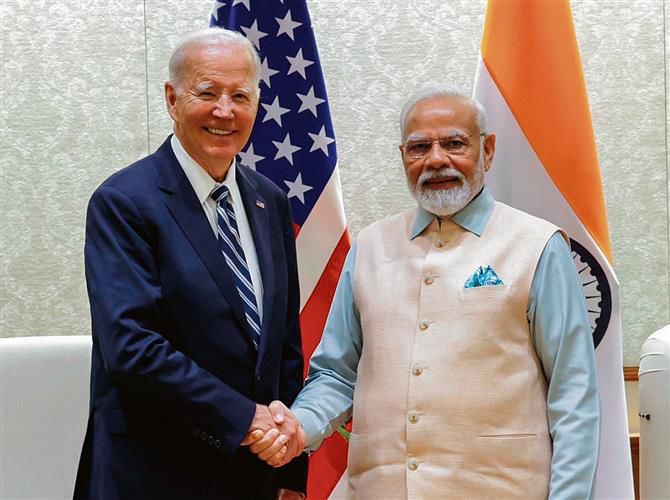India-US relations growing despite rough edges
WHILE elections in India have resulted in the formation of a coalition government led by Prime Minister Narendra Modi, the US presidential election campaign has triggered confusion. There has never been any love lost between the top contenders — President Joe Biden and his predecessor Donald Trump. Biden had, after all, prevailed over Trump in the 2020 election. The world has seen a medically unfit Biden laying bare his frailties in a televised nationwide debate with Trump. Large sections of the US public appear aghast at the health of their President. Moreover, the neutrality of the US Supreme Court in the run-up to the election appears questionable.
The current indications are that Biden may have to withdraw from the contest or face a defeat in the election. There appears very little prospect of him winning against Trump. In any case, Secretary of State Antony Blinken and National Security Adviser Jake Sullivan have good relations with their Indian counterparts, S Jaishankar and Ajit Doval, respectively. These relationships are crucial for smooth ties between New Delhi and Washington. The next Foreign Secretary, Vikram Misri, has served in the US and China and is well positioned to deal skilfully with both nations. It is clear that the primary focus of India’s polices will be on building a strong and peaceful neighbourhood, primarily extending from the Strait of Malacca to the oil-rich Strait of Hormuz.
While Trump, quite evidently, has a good rapport with PM Modi, the same cannot be said for Biden. It is apparent that Biden was responsible for the recent State Department statement that expressed concern about human rights in India. The department asserted: “In India, we see a concerning increase in anti-conversion laws, hate speech, demolitions of homes and places of worship for members of minority faith communities”. Not surprisingly, PM Modi is headed for Moscow for a meeting with Russian President Vladimir Putin, who has been not only friendly and helpful but has also invariably spoken with restraint and respect for India.
Despite these developments and ostensible differences, the India-US relationship has grown stronger with the passage of time. India’s relations with the UK are, meanwhile, now marked by bipartisan support and growing ties with both Labour and Conservative parties. A similar view prevails in Europe, with both France and Germany set to improve ties with India. France has remained a reliable supplier of a range of weapons, from Mirage 2000 fighters to frontline Rafale jets. India has acquired 36 Rafale fighters, with orders for a further 26 currently under negotiations. This is apart from the earlier import of submarines from France.
In the larger perspective, another important factor to be borne in mind is how India’s relations are being calibrated with other global power centres amid growing India-US ties. There is an increasing focus on how India responds to the growing power of China in its relations with countries across the world. This is particularly so in India’s neighbourhood, where one can be sure that Chinese power and influence will inevitably seek to undermine India’s national security and economic interests.
The European Union (EU) sees China as a ‘partner’ for cooperation. But, at the same time, it sees China as a dangerous rival. It asserts that China has become less open to the world, while taking a more assertive posture abroad, by resorting to economic coercion. China’s policies make its trade relations with the EU imbalanced. The EU acknowledges that China does not operate on a level playing field. There is EU concern at the growingly close relations between Beijing and Moscow. While the EU acts largely as a junior partner of the US on security issues, it is highly unlikely to assist or join any foreign power facing Chinese aggression, unless it is backed by the US. The EU countries could, however, join the US diplomatically in situations where they face direct pressure from Washington.
Asian countries facing Chinese hostility can expect virtually nothing from the EU without American support, especially when they get into a conflict situation with China. It needs to be remembered that it is India that has provided BrahMos missiles to the Philippines, which has been facing territorial pressures from China. But India itself cannot lower its guard when it comes to tensions and uncertainties on its borders with China. More importantly, China continues to woo India’s South Asian neighbours with a view to securing facilities to berth its ships in South Asian/Indian Ocean ports. It already has unfettered access to the Gwadar port in Pakistan’s Balochistan province. China’s attention has for long been on Myanmar, where New Delhi is set to take over the operation of the Sittwe port. India’s pact with Iran to develop the Chabahar port gives it access to Afghanistan and Central Asia, bypassing Pakistan.
There is a keen interest internationally in the role of the Indian Navy following the outbreak of the Israel-Hamas conflict. Over the past six months, Indian naval ships have guarded the safety of shipping lines across the Gulf of Aden and adjoining areas in the Arabian Sea and the East Coast of Somalia. The Gaza conflict has triggered massive violence and international outrage. India has skilfully avoided getting involved in this conflict. In the meantime, New Delhi has remained focused on the Gulf countries, where around 88 lakh Indians live and work, with the largest number residing in the UAE and Saudi Arabia. There has been a conscious effort to widen ties with these countries, notably Saudi Arabia and the UAE, where a distinctly warm relationship has been developed with their rulers. This is unquestionably the most important region for India in its neighbourhood.
One hopes that India will continue to build on what it has achieved, while making it clear that it will act firmly on the China-Pakistan axis, which remains the strongest challenge to India’s security.









